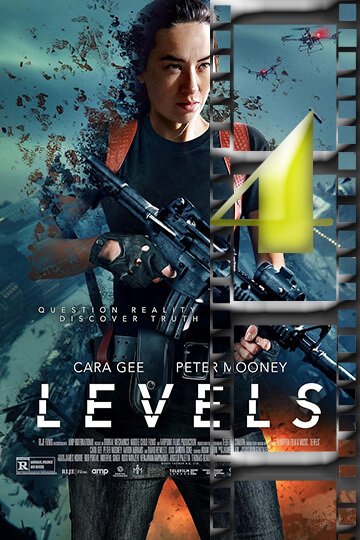



What’s It About
After witnessing his girlfriend’s murder, a man risks everything, including reality itself, to discover the truth.



MOVIESinMO REVIEW
In today’s flood of AI-themed movies, most merely scratch the surface of what artificial intelligence means for humanity. While “The Matrix” once made us question the nature of reality itself, few recent films have achieved that level of philosophical impact. “Levels,” directed by Adam Stern, attempts to revive these more profound questions but sometimes stumbles in the balancing of intellectual ambitions and entertainment value. First off, the setting: The film takes place in a not-too-distant future where technology has made most of the old-world businesses extinct. Our protagonist, Joe, portrayed by Peter Mooney, persists in keeping a bookstore that becomes outmoded and a little reminder of times gone awry. The movie puts that backdrop to use in effective comparison of old and new, physical and digital. Mooney brings a quiet authenticity to Joe so the audience is able to relate to him as one trying to keep something genuine in a world moving ever more to the digital. The love interest comes when Ash—played by Cara Gee—walks into Joe’s store. The love blossoms quickly but feels true to life due to the chemistry between the actors. This is particularly true for Gee, who gives Ash a mysterious edge that never let his romance feel unconvincing. “Levels” takes its sweet time to develop their relationship, which of course makes the sudden violence that follows all the more jarring. When a stranger appears and shoots Ash in broad daylight, the scene proves to be jarringly shocking, not just for the grim reality but also for how it burst apart the measured pace the film had built up. The first crack in reality comes when Joe tries to shoot himself in the head and the gun simply will not go off. What was a romance has now become science fiction, and in interesting ways, questions are brought up before being answered. The second of those shocks—Joe exists inside a digital universe—unfolds through a series of messages from the supposedly dead Ash, and it becomes an engaging mystery to which viewers feel compelled to stick around. Hunter, as played by Aaron Abrams, is a rather complex antagonist. As the creator of the digital world, his motives go far beyond mere villainy. He’s using this simulation to explore alternative scenarios, essentially running “what if” experiments on a universal scale. The film touches on current events through these simulations, including a pointed reference to testing the effects of authoritarian leadership. Abrams plays Hunter with a mix of scientific detachment and underlying humanity that makes his character more than a typical mad scientist. The awards should, however, go to the special visual effects. With little back-up, however, Stern-visual effects guy-has made believable digital landscapes. These action scenes offer less frequency, but technical know-how through physical prowess is still on display. Particularly effective are the scenes where reality lapses into a glitch, providing a disquieting sensation to its audience that reinforces the artificiality of Joe’s world. The influence of video gameplay is apparent without Hemingway-fication of the movie’s aesthetics. As such, David Hewlett’s supporting presence here provides another layer of the sci-fi credibility given his history with the genre. His character provides crucial exposition, though this points to one of the film’s main weaknesses: its reliance on verbal explanation rather than visual storytelling. Many key concepts and rules of the digital universe are explained through lengthy dialogue rather than demonstrated through action or consequence. The film raises fascinating ethical questions about artificial consciousness. When Joe learns he’s an AI, the film takes up the discussion of what this means for his sense of self. Can artificial beings experience real love? If they can feel pain and pleasure, do they deserve the same rights and privileges as humans? The film posits that consciousness-perhaps whether that be biological or digital-carries value and rights. However, these philosophical threads often get tangled in exposition rather than being woven naturally into the story. Technical elements like lighting, sound design, and editing show professional polish that elevates the film above typical low-budget sci-fi. The score effectively underlines emotional moments without overwhelming them, and the cinematography makes clever use of framing to suggest the artificial nature of Joe’s reality. Small details, like subtle glitches in background elements, reward attentive viewers. While “Levels” draws inspiration from both “The Matrix” and “Free Guy,” it carves its own identity in the AI thriller genre. The central motif is Joe’s personal discovery, give-and-take with the audiences experiencing along with him his existential theorizing crisis. Tension and genuine philosophical uncertainties are created when truths trickled down about his very world. Yet, somewhere along this winding road, the movie’s ambition seems to keel over outside the reasonable. And if we are talking action sequences always seemed to have a billion dollars worth of instant recognition going for them. The ones in ToD are few, rather lackluster and don’t do anything to help it in the pacing department. Long expository scenes abound, and they hardly help with the sleep-inducing pacing at all. These explanatory scenes, while necessary for understanding the complex premise, could have been better integrated into the action. The timing of “Levels” is both fortunate and unfortunate. While AI is a hot topic in current discourse, with tech leaders debating simulation theory and AI consciousness, this also means audiences are more sophisticated about these concepts than ever before. Some of the revelations in the film may strike viewers who are already exposed to similar tropes in other works or real-life discourse as less revelatory. For all its flaws, “Levels” is an admirable attempt at dealing with complex themes under the constrains of independent filmmaking. It proves that meaningful science fiction doesn’t always require massive budgets—just creative vision and compelling ideas. While it may not reach the philosophical heights of its inspirations, it has plenty to say and a level of technical polish that should command the attention of fans of science fiction and anybody interested in the deeper usage of artificial intelligence.
OUR RATING – A LOW BUDGET 4

